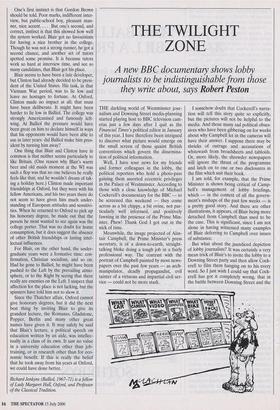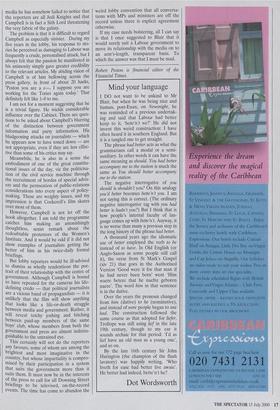THE TWILIGHT ZONE
A new BBC documentary shows lobby journalists to be indistinguishable from those
they write about, says Robert Peston THE darkling world of Westminster jour- nalism and Downing Street media-planning started playing host to BBC television cam- eras just a few days after I quit as the Financial Times's political editor in January of this year. I have therefore been intrigued to discover what picture would emerge on the small screen of those quaint British conventions which govern the dissemina- tion of political information.
Well, I have sour news for my friends and former colleagues in the lobby, the political reporters who hold a photo-pass gaining them assorted eccentric privileges in the Palace of Westminster. According to those with a close knowledge of Michael Cockerell's documentary for the BBC — to be screened this weekend — they come across as a bit chippy, a bit ovine, not par- ticularly well informed, and positively fawning in the presence of the Prime Min- ister. Phew! Thank God I got out in the nick of time.
Meanwhile, the image projected of Alas- tair Campbell, the Prime Minister's press secretary, is of a down-to-earth, straight- talking bloke doing a tough job in a fairly professional way. The contrast with the portrait of Campbell painted by most news- papers over the past few years — as arch- manipulator, deadly propagandist, evil tainter of a virtuous and impartial civil ser- vice — could not be more stark. I somehow doubt that Cockerell's narra- tion will tell this story quite so explicitly, but the pictures will not be helpful to the media. And those many sad political obses- sives who have been gibbering on for weeks about why Campbell let in the cameras will have their answer. I suppose there may be shrieks of outrage and accusations of whitewash from broadsheets and tabloids. Or, more likely, the shrewder newspapers will ignore the thrust of the programme and latch on to one or two disclosures in the film which suit their book.
I am told, for example, that the Prime Minister is shown being critical of Camp- bell's management of lobby briefings, which — in the context of all the govern- ment's mishaps of the past few weeks — is a pretty good story. And there are other illustrations, it appears, of Blair being more detached from Campbell than used to be the case. This is significant, since I am not alone in having witnessed many examples of Blair deferring to Campbell over issues of substance.
But what about the jaundiced depiction of lobby journalists? It was certainly a very mean trick of Blair's to invite the lobby to a Downing Street party and then allow Cock- erell to film them hanging on to his every word. So I just wish I could say that Cock- erell has got it completely wrong, that in the battle between Downing Street and the media he has somehow failed to notice that the reporters are all Jedi Knights and that Campbell is in fact a Sith Lord threatening the very fabric of the galaxy. The problem is that it is difficult to regard Campbell as especially sinister. During my five years in the lobby, his response to sto- ries he perceived as damaging to Labour was frequently a crude, personalised attack, but I always felt that the passion he manifested in his animosity simply gave greater credibility to the relevant articles. My abiding vision of Campbell is of him bellowing across the press gallery, in front of about 20 hacks, Teston you are a c—, I suppose you are working for the Tories again today.' That definitely felt like 1-0 to me.
I am not for a moment suggesting that he is a trivial figure. He wields considerable influence over the Cabinet. There are ques- tions to be asked about Campbell's blurring of the distinction between government information and party information. His bludgeoning attacks on journalists — which he appears now to have toned down — are not appropriate, even if they are less effec- tive than some of his critics may say.
Meanwhile, he is also in a sense the embodiment of one of the great constitu- tional issues of the day, viz the politicisa- tion of the civil service machine through the recruitment of hordes of special advis- ers and the permeation of public-relations considerations into every aspect of policy- making. These are weighty issues, and my impression is that Cockerell's film skates over most of them.
However, Campbell is not let off the hook altogether. I am told the programme catches him making an astonishingly thoughtless, sexist remark about the redoubtable protestors of the Women's Institute. And it would be odd if it did not show examples of journalists getting the better of him in his twice-daily formal briefings.
But lobby reporters would be ill-advised to dismiss as wholly tendentious the por- trait of their relationship with the centre of government. Although Campbell is bound to have repeated for the cameras his life- defining credo — that political journalists are a vicious band of propagandists — it is unlikely that the film will show anything that looks like a life-or-death struggle between media and government. Rather, it will reveal tetchy joshing and bitching between paid-up members of the same boys' club, whose members from both the government and press are almost indistin- guishable to the untrained eye. This certainly will not do the reporters any favours, some of whom are among the brightest and most imaginative in the country, but whose impartiality is compro- mised by their participation in a system that suits the government more than it suits them. It must now be in the interests of the press to call for all Downing Street briefings to be televised, on-the-record events. The time has come to abandon the weird lobby convention that all conversa- tions with MPs and ministers are off the record unless there is explicit agreement otherwise.
If my case needs bolstering, all I can say is that I once suggested to Blair that it would surely suit a Labour government to move its relationship with the media on to an arm's-length, transparent basis. To which the answer was that I must be mad.
Robert Peston is financial editor of the Financial Times.



























































 Previous page
Previous page